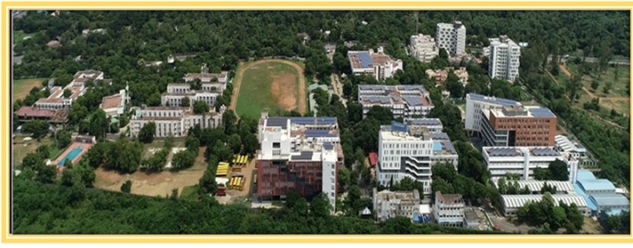Crescent Sustainability Initiatives
Affordable and Clean Energy (SDG 7)
Benchmarking Carbon Efficiency:
Redefining Institutional Environmental Performance B. S. Abdur Rahman Crescent Institute of Science and Technology (BSACIST) has implemented a comprehensive carbon management strategy that significantly reduces its carbon footprint through innovative and sustainable practices. The institute’s total carbon emission stands at 7,369 tons per year, with a per capita carbon footprint of 1.05 tons, which is remarkably lower than the national average of 1.58 tons per capita. This represents a 33.54% reduction from the national average, demonstrating the institution’s commitment to environmental sustainability and carbon reduction.
Green Infrastructure – Strategic carbon offsetting through Ecological Interventions:
The carbon offsetting strategy at BSACIST is multifaceted, leveraging green areas and renewable energy initiatives to mitigate carbon emissions. The campus boasts 19 acres of green spaces, including tree-covered areas, lawns, and Beema Bamboo plantations, which collectively absorb 747 tons of CO2 annually. This represents 10.13% of the total carbon emissions, with the green areas covering 37.86% of the campus. The solar infrastructure plays a crucial role in this carbon reduction effort, with 650 kWp of solar photovoltaic plants installed across campus buildings, offsetting approximately 474 tons of CO2 emissions annually – equivalent to planting 21,545 trees.

Figure VII (2.3)-1 : Green Areas – 19 Acres (37.86% of the Total Campus

Figure VII (2.3)-2 :Beema Bamboo Plantations

Figure VII (2.3)-3 :Installed Roof Top Solar Power Plants
Emission Management : Integrated Technological and Operational Strategies
The institute’s carbon management approach extends beyond green spaces and solar energy. The comprehensive strategy includes multiple energy-efficient technologies and sustainable practices across various campus operations. Transportation emissions are carefully managed, with detailed tracking of petrol and diesel consumption. Electricity consumption, which accounts for the largest portion of carbon emissions (5,251,791 kg CO2), is being systematically reduced through energy-efficient technologies, including high-performance building envelopes, efficient lighting systems, and advanced HVAC technologies. The institute has also implemented water conservation measures and waste management strategies that contribute to overall carbon reduction.
Innovative Technologies and Collaborative Sustainability : Beyond Traditional Approaches
Innovative technologies and collaborative approaches further enhance BSACIST’s carbon management efforts. The implementation of zero-export devices for solar power management, solar water heating systems, and energy-efficient building designs demonstrate a holistic approach to sustainability. The solar water heating systems, with a total capacity of 39,500 litres, are estimated to save approximately 24 lakhs in power consumption annually. Additionally, student-driven projects, such as solar street lighting installations, showcase the institute’s commitment to engaging the academic community in sustainable practices.
Driving Sustainability: The Role of Eco-Friendly Vehicles in BSACIST’s Green Transportation Initiative
The integration of eco-friendly vehicles into the university’s transportation system highlights a practical application of BSACIST’s sustainability values, encouraging a shift toward cleaner mobility solutions while reducing overall campus emissions.
Figure VII (2.3)-4 :Eco-Friendly Conveyance @ Crescent
| Table VII (2.3)-1 :Carbon foot print / Capita | ||||||
| Activity Data | Type | unit | GHG | Emission factor | Quantity | CO2 emission /year |
| Transportation | petrol | litres | KgCO2e | 2.196 | 1300 | 2855 |
| diesel | litres | 2.65 | 381461 | 1010872 | ||
| Electricity | kWh | KgCO2e | 1.2 | 4376492 | 5251791 | |
| Paper consumption | kg | KgCO2e | 0.683 | 21900 | 14958 | |
| Water consumption | water supply | cum | KgCO2e | 0.8 | 160611 | 128489 |
| Solid waste | kg | KgCO2e | 3.7 | 259560 | 960372 | |
| Total CO2 Emission Per Year | Kg | KgCO2e | 7369336 | |||
| Over all carbon foot print / year | Ton | 7369 | ||||
| Total population (avg) | 7000 | |||||
| Carbon Foot Print per capita in Ton | 1.05 | |||||
| National average per capita | 1.58 Ton/Capita/Year |
| Actual CO2 emission | 1.05 Ton/Capita/Year |
| % of CO2 emission – on National avg. | 66.63% |
| % of CO2 reduced from National avg. | 33.37% |
10 % of Carbon foot print is offset by the above environment – friendly measures in campus.
Calculation:
Carbon Offsetting
Total trees green area – 19 Acres
Total Co2 absorption ton/year – 747 tones
Over all carbon foot print/year (Co2 Emission) – 7369 tones
% of Co2 → offsetting within campus
(747 / 7369 X 100) – 10.13%
Bal: 90% to be offset by planting more trees or trading
% of Linear area (19/50 Acres – carbon foot print) – 38%
Carbon Footprint
Total Co2 Emission per year: Kg – 7369336
Over all carbon foot print / year = 7369336/1000 – 7369 tones
Total Population (Avg.) – 7000 (students)
Carbon foot print per Capita in Ton = 7369/7000 – 1.05
National Avg. per emission – 1.58 / ton / capita / year
Actual Co2 Emission – 1.05 / ton / capita / year
% of Co2 Emission on National Avg. 1.05/1.58 X 100 – 66.46%
% of Co2 reduced from National Avg. 100 – 66.46 – 33.54%
Visioning Net-Zero: The Roadmap to Transformative Environmental Stewardship
The institute’s carbon management strategy represents a forward-thinking approach to environmental stewardship. While the current initiatives offset 10% of carbon emissions within the campus, BSACIST has a clear plan to address the remaining 90% through continued tree planting, exploring carbon trading options, and implementing increasingly sophisticated sustainable technologies. The ultimate goal is to transform the campus into a net-zero energy environment that not only minimizes its carbon footprint but also serves as a model for sustainable institutional development. By consistently innovating and implementing cutting-edge green technologies, BSACIST demonstrates that comprehensive carbon management is not just an environmental necessity but an achievable and impactful institutional commitment.
POLICY FOR ENERGY-EFFICIENT RENOVATION AND BUILDING
Issue: 04; Revised on 2023
| Policy Created on | July 2009 |
| 1st Revision amended on | IQAC Meeting held on 27th October 2017 |
| 2nd Revision amended on | IQAC Meeting held on 31st March 2021 |
| 3rd Revision amended on | IQAC Meeting held on 16th June 2023 |
Responsible Executive : Director (IQAC)
Responsible Office : Internal Quality Assurance Cell, Estate Office, and SDG Cell
Contacts : Registrar, Director (IQAC)
The B.S. Abdur Rahman Crescent Institute of Science and Technology is committed to ensuring that all renovations and new constructions on campus adhere to stringent energy efficiency standards. This policy aims to:
- Ensure universal access to affordable, reliable, modern energy services.
- Increase substantially the share of renewable energy in the global energy mix.
- Double the global rate of improvement in energy efficiency
- Enhance international cooperation to facilitate access to clean energy research and technology.
- Expand infrastructure and upgrade technology to supply modern and sustainable energy services, particularly in developing countries.
7.2 REASON FOR THIS POLICY
This policy is established to promote energy-efficient practices in renovating existing infrastructures and constructing new buildings. By adhering to energy efficiency standards, the Institute aims to reduce greenhouse gas emissions, lower operational costs, and contribute to the global efforts to combat climate change, which aligns with SDG 7 – Affordable and Clean Energy.
7.3 RESPONSIBILITIES
7.3.1 Policy Principles
The Institute shall implement the following principles to ensure compliance with energy efficiency standards:
- All renovations and new constructions must achieve recognised building rating systems such as EDGE, IGBC, and LEED.
- Sustainable design features, including using renewable energy sources, shall be integrated into all projects.
- An efficient waste management plan shall be established to minimize waste and promote recycling.
- Rainwater harvesting systems shall be implemented in all new buildings.
- Energy conservation shall be prioritized through the installation of energy-efficient appliances and equipment.
- Regular audits of energy consumption shall be conducted to identify areas for improvement.
- Use of low VOC (Volatile Organic Compounds) materials in construction and renovation to minimize harmful emissions.
- Adoption of eco-friendly housekeeping practices using biodegradable chemicals.
- Implementation of high reflective roofing materials and green roofs to reduce heat island effects.
- Encourage water-efficient landscaping and high-efficiency irrigation technology in new construction projects.
- Support R&D activities towards energy-efficient renovation and building.
- Enhance national/international cooperation to facilitate access to green building technology.
- Dissemination of Policy
- Awareness programs shall be conducted regularly for all stakeholders regarding energy-efficient practices.
- This policy shall be publicly accessible on the Institute’s website and updated as necessary.
7.3.3 Enforcement of Policy
- The Director (Planning and Development) and their team are responsible for monitoring compliance with this policy.
- Compliance shall be communicated to architects, design engineers, and construction workers involved in projects.
7.2.1 – ENERGY EFFICIENCY POLICY.pdf
POLICY FOR DIVESTMENT FROM CARBON-INTENSIVE ENERGY INDUSTRIES
Issue: 04; Revised on 2023
| Policy Created on | July 2009 |
| 1st Revision amended on | IQAC Meeting held on 27th October 2017 |
| 2nd Revision amended on | IQAC Meeting held on 31st March 2021 |
| 3rd Revision amended on | IQAC Meeting held on 16th June 2023 |
Responsible Executive: Director (IQAC)
Responsible Office: Internal Quality Assurance Cell, Estate Office, and SDG Cell
Contacts: Registrar, Director (IQAC)
The B.S. Abdur Rahman Crescent Institute of Science and Technology is committed to divesting from carbon-intensive energy industries, particularly coal and oil, to promote sustainable energy practices and contribute to the global efforts to combat climate change. This policy aims to:
- Ensure universal access to affordable, reliable, and modern energy services.
- Increase substantially the share of renewable energy in the global energy mix.
- Double the global rate of improvement in energy efficiency.
- Enhance international cooperation to facilitate access to clean energy research and technology.
- Promote investment in energy infrastructure and clean energy technology.
7.2 REASON FOR THIS POLICY
This policy is established to minimize the Institute’s carbon footprint by reducing investments in fossil fuels and promoting renewable energy sources. By divesting from carbon-intensive industries, the Institute aligns with the United Nations’ Sustainable Development Goals, particularly SDG 7: Affordable and Clean Energy, and supports the transition to a sustainable energy future.
7.3 RESPONSIBILITIES
7.3.1 Policy Principles
The Institute shall implement the following principles to ensure effective divestment from carbon-intensive energy industries:
- Conduct a comprehensive review of current investments to identify carbon-intensive assets.
- Gradually divest from all investments in coal and oil industries within a specified timeframe.
- Reallocate funds towards renewable energy projects and sustainable technologies.
- Collaborate with financial institutions that prioritize sustainable investment practices.
- Promote transparency in investment decisions and publicly report on divestment progress.
- Engage with stakeholders, including students and faculty, to raise awareness about the importance of divestment from fossil fuels.
- Support research and development initiatives focused on clean energy technologies.
7.3.2 Dissemination of Policy
- This policy shall be publicly accessible on the Institute’s website to ensure transparency.
- Awareness programs shall be conducted regularly for all stakeholders regarding the importance of divestment from carbon-intensive industries.
- Updates on divestment progress shall be communicated through newsletters and reports.
7.3.3 Enforcement of Policy
- The Director (Finance) and their team are responsible for monitoring compliance with this policy and reporting on divestment progress.
- Any breach of this policy may result in a review of investment strategies and potential disciplinary actions as prescribed by the Institute’s code of conduct.



